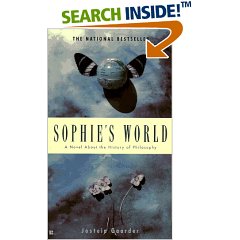Sophie's World

I finished this book a couple of weeks ago, after reading it together with Jeannine. This is not a book I would have read without her encouragement.
The idea is that this is a novel about the history of philosophy - presumably to make learning about philosophy more palatable to those who might otherwise find themselves bored stiff reading a straight history of philosophy. I found the histories of the various philosophers and schools of philosophical thought fairly interesting, and thought most were quite good summaries. Unfortunately, the story surrounding the history fell flat with me. The characters were dull, or when not dull, weird - but in a dull way. The action of the story was jerky, moving in fits and starts, interspersed with frequent paeans to the United Nations. If Mr. Gaardner had just written his history of philosophy, this book would have been a lot better, and a lot shorter.
If you plan to read the book someday, and don't want the "mystery" to be spoiled for you, read no further.
If you don't plan to read the book, or have read it already, here's the plot in a nutshell:
Sophie Amundsen, almost 15 years old, begins receiving mysterious - and creepy - letters from an unknown correspondent. The writer begins teaching Sophie about philosophy, and she tries to find out who he is. Eventually, she tracks him down and they begin meeting in person for their philosophy lessons. (Sophie's mom is justifiably worried about all of this - it's like a parent's worst nightmare: your child secretly meets a stranger and develops a relationship with him; he turns out to be a weird, middle-aged man who has no desire to meet the parents.) At the end of the book, after many pages of story distracting from the actual philosophy content, Sophie and her teacher, Alberto, realize they are just characters in a story written by a major in the (SURPRISE!) U.N. to amuse and edify his daughter, Hilde. Sophie and Alberto manage to distract the major, and escape from their story into another dimension - one peopled by storybook characters.
This just didn't work for me. I'd rather have read a straight history of philosophy, followed by a book by Jasper Fforde. However, if anyone read Sophie's World and enjoyed it, or found it thought-provoking, I'd love to hear your thoughts.
Labels: books


1 Comments:
The reason the action of the story seems jerky and weird is that it mirrors the various philosophies under discussion. For instance, when Sophie is reading about Aristotle and order, she gets out her legoes and considers their orderly design.
As the philosophies become more and more modern and strange, the story spirals out of control ("weird" is really a nice way of saying it) until the garden party where nothing makes sense and we're left with the postmodern worldview in all its glory.
I've only read the book once, and it took me a while to catch on, so I don't really know, offhand, how good a job Gaarder did with making his story reflect each philosophy and worldview. I found the ending repulsive and absurd at first, too--like a bad joke. But I think that's the point. Postmodernism offers us nothing to make sense and stability in the world, and no one seems to have a clear definition of reality. Gaarder thinks the UN is the answer, but all the Norwegians seem to feel that way.
I am actually a moderate fan of Gaarder--I've read everything that's been translated into English--simply because he asks good questions and his books go a long way toward making me think. I can only take him in small doses though--I couldn't read one book after another by him, and I haven't reread any of them except The Christmas Mystery
Post a Comment
Subscribe to Post Comments [Atom]
<< Home